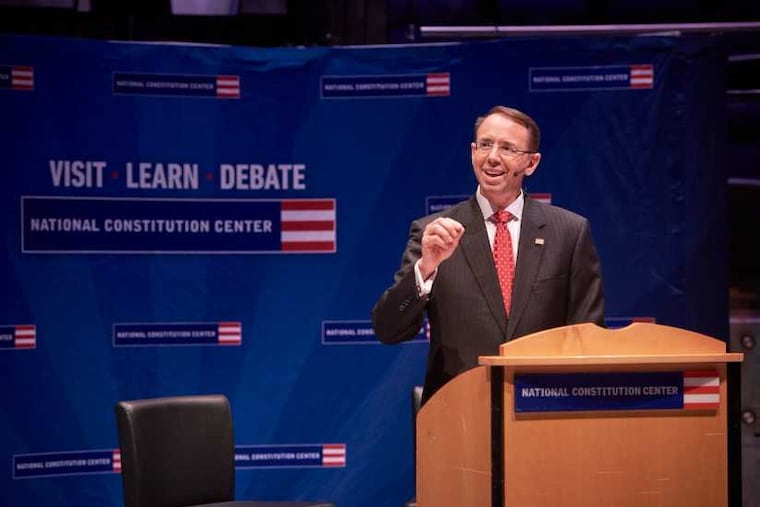Deputy AG Rosenstein addresses Constitution Center crowd, stays mum on Mueller
When Rod Rosenstein shows up at the U.S. Constitution Center, someone's bound to ask about Robert Mueller.

The moderator seated across from Deputy Attorney General Rod Rosenstein on Monday evening rifled through a thick stack of index cards — questions submitted from the audience before them at the National Constitution Center.
"There's a number of questions on this subject," said the moderator, center president Jeffrey Rosen. The audience chuckled. They knew what was coming next. "You can answer them as you feel best — but here's one: At what point did you decide to appoint an independent counsel?"
Rosenstein smiled. He'd known what was coming, too.
"I didn't appoint an independent counsel, I appointed a special counsel," he corrected, not ungraciously. "And, no, I'm not going to, obviously, go into any detail."
The career U.S. Department of Justice official was in town for a celebration of the 230th anniversary of the signing of the Constitution, giving a speech billed as a discussion on the rule of law and prosecutorial discretion.
But Rosenstein has been at the center of a political firestorm since his appointment — since his boss, Attorney General Jeff Sessions, recused himself from the investigation into Russian meddling in the election, since President Trump fired FBI Director James Comey and implied he did it over the Russian investigation, and since Rosenstein himself appointed a special counsel to the investigation.
In other words, someone was bound to ask about Robert Mueller.
But Rosenstein, though he noted that the president has a right to fire any political appointee, demurred on details of the investigation. He handled a question about presidential pardon power — apparently a reference to President Trump's controversial pardon of Arizona Sheriff Joe Arpaio — with a similar deflection: "The pardon power is in the Constitution, and presidents have exercised it before."
He quoted attorneys general and federal judges who tried cases in the 1940s and launched into a wonky discussion on prosecutorial discretion — how prosecutors decide who to charge, and why, and how severely: "If prosecutors bring charges that are motivated by an effort to make a political point rather than by an objective need for criminal punishment, public confidence in the rule of law is jeopardized," he said.
Still, his bosses got the occasional mention.
"If we permit the rule of law to erode because it does not directly harm our personal interests, the erosion may eventually consume us as well. The rule of law is not self-executing. If it collapses — if the people lose faith in the rule of law — then everyone will suffer," he said. "President Trump honors that principle by nominating judges who 'administer justice without respect to persons,' and by appointing Department of Justice officials who support the rule of law."
Rosenstein, who previously served as the U.S. attorney for the Eastern District of Maryland, grew up in Lower Moreland, and is widely respected in legal circles as a serious, dedicated prosecutor, deeply committed to ethics. "What we do here is not about politics," he told the Inquirer and Daily News in July. "People are going to comment on what we do, people are going to criticize what we do. Sometimes they're going to compliment us on what we do. But it can't affect what we do."
Attendees said they had been impressed by the speech, and in Rosenstein's disciplined manner — though some admitted the prospect of hearing the deputy attorney general dish on the Russia investigation was a draw.
"I guess we would have expected to hear something about the current special prosecutor," said Gil Feinberg, an attorney and a member of the Constitution Center. "But it was definitely interesting, how he dealt with the political questions."
Matthew Stellfox, 20, the president of Widener University's libertarian group Young Americans for Liberty, said he'd been impressed by Rosenstein's restraint.
"The country is so polarized now, and I was very impressed he was able to keep it so unpartisan and so unbiased," he said. "It's one of the most difficult times, if not the most difficult time, to give a speech like that."